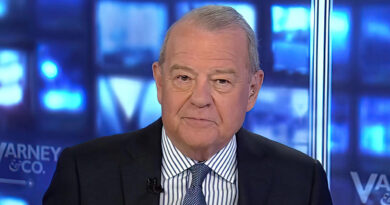The Latest: Trump rails against ‘medical deep state’ on timing of Pfizer vaccine news
WASHINGTON – President Donald Trump is lashing out at the Food and Drug Administration following a disclosure Monday that an experimental coronavirus vaccine from pharmaceutical giant Pfizer is more than 90% effective, convinced the timing – six days after Election Day – proves the “medical deep state” deliberately tried to sabotage his electoral prospects by delaying the results.
Shortly after Trump heard the news Monday, he demanded Health and Human Services Secretary Alex Azar “get to the bottom” of what happened with Pfizer, according to a senior White House official who spoke on the condition of anonymity to describe the president’s actions.
A few hours later, the issue was front and center at a meeting of the White House coronavirus task force when FDA Commissioner Stephen Hahn briefed members about the vaccine data.

President Donald Trump listens as Dr. Stephen Hahn, commissioner of the U.S. Food and Drug Administration, speaks during a media briefing in the James Brady Briefing Room of the White House in Washington in August. AP Photo/Alex Brandon, File
The meeting agenda that day had been drafted so Hahn could walk members through the vaccine approval process, a senior administration official said. Hahn said the timing was the sole result of independent decisions made by Pfizer on collecting and reviewing the information, according to three senior administration officials who spoke on the condition of anonymity to describe internal affairs.
Azar, Hahn’s boss, pointedly contradicted Hahn in front of Vice President Mike Pence, asserting that the FDA’s actions had in fact contributed to a delay in Pfizer’s announcement. He also asked questions that some officials thought suggested Azar believed Pfizer’s timing was affected by political motivations.
Trump weighed in Monday night, tweeting without evidence that the FDA and Pfizer intentionally withheld the news until after the election.
Trump’s anger at the FDA raises fresh questions about whether Hahn will hang on to his job until Jan. 20 – when Trump leaves office – in an administration intent on purging officials deemed insufficiently loyal. Trump called Hahn shortly before he tweeted Monday and was “screaming at him” about the Pfizer announcement, in the words of one senior administration official, who spoke on the condition of anonymity to describe sensitive matters. The accusations against the FDA may further fuel baseless conspiracy theories that the election was stolen from Trump.
The FDA and HHS declined to comment.
Although there is no evidence that Pfizer withheld data or did not report it as soon as it was available, a White House official said without evidence that Pfizer “either knew the data and sat on it, or intentionally did not review it as originally planned, in order to push it beyond the election for political purposes.” The official spoke on the condition of anonymity because they were not authorized to speak publicly.
But Pfizer did not have access to the data until the Sunday after the election and could not have known the results before then. Neither the trial participants nor the company knew who was getting the vaccine, and the company did not know how many cases of COVID-19, the disease caused by the coronavirus, there were on Election Day. An independent monitoring committee analyzed the data Sunday and informed Pfizer chief executive Albert Bourla, who learned of the results at 2 p.m. that day. The company announced the news the next morning.
Read the full story here.
Graham giving $1M to help Georgia’s GOP senators
Republican Sen. Lindsey Graham, who was just reelected in South Carolina, says he’s donating $1 million of his campaign money to help two GOP senators win runoff races in neighboring Georgia.

Sen. Lindsey Graham, R-S.C., arrives for a Senate Judiciary Committee hearing on Capitol Hill in Washington, Tuesday, Nov. 10, on a probe of the FBI’s Russia investigation. AP Photo/Susan Walsh, Pool
Graham told Fox News Channel’s “Fox & Friends” on Thursday that Republicans need to counter a “tsunami of liberal money” flowing into Georgia ahead of the Jan. 5 runoff elections, which will determine whether Republicans or Democrats control the Senate. Democrats already control the House, and Democrat Joe Biden is the president-elect after beating President Donald Trump in their White House contest.
In the Georgia runoffs, Democrat Jon Ossoff is looking to unseat Republican Sen. David Perdue and Democrat Raphael Warnock is facing off against Republican Sen. Kelly Loeffler.
Biden moves forward without help from Trump’s intel team
WASHINGTON — The presidential race was hovering in limbo in 2000 when outgoing President Bill Clinton decided to let then-Gov. George W. Bush read the ultra-secret daily brief of the nation’s most sensitive intelligence.
Clinton was a Democrat and his vice president, Al Gore, was running against Republican Bush. Gore had been reading the so-called President’s Daily Brief for eight years; Clinton decided to bring Bush into the fold in case he won – and he did.
President Trump has not followed Clinton’s lead. As he contests this year’s election results, Trump has not authorized President-elect Joe Biden to lay eyes on the brief.
National security and intelligence experts hope Trump changes his mind, citing the need for an incoming president to be fully prepared to confront any national security issues on Day One.
“Our adversaries aren’t waiting for the transition to take place,” says former Michigan Republican Rep. Mike Rogers, who was chairman of the House intelligence committee. “Joe Biden should receive the President’s Daily Brief starting today. He needs to know what the latest threats are and begin to plan accordingly. This isn’t about politics; this is about national security.”
U.S. adversaries can take advantage of the country during an American presidential transition and key foreign issues will be bearing down on Biden the moment he steps into the Oval Office.
Read the full story here.
Biden pleads for cooperation, but deal-makers are hard to find in this Congress
WASHINGTON — President-elect Joe Biden feels at home on Capitol Hill, but the place sure has changed since he left.
The clubby atmosphere that Biden knew so well during his 36-year Senate career is gone, probably forever. Deal-makers are hard to find. And the election results haven’t dealt him a strong hand to pursue his legislative agenda, with Democrats’ poor performance in down-ballot races likely leaving them without control of Congress.
The dynamic leaves Biden with little choice but to try to govern from the vanishing middle of a Washington that’s been badly ruptured by the tumult of the last decade. With the forces of partisanship and gridlock entrenched, ending what Biden called the “grim era of demonization” could be the central challenge of his presidency — and one that could prove vexing if forces on the left and right refuse to go along.
“There is a certain opportunity for bipartisanship, but it is all going to be deals in the middle,” said Rohit Kumar, a former aide to Senate Majority Leader Mitch McConnell, R-Ky. “What I don’t know is whether the (Democratic and Republican) parties will allow them to do that because the parties have gotten a lot more polarized.”
While it is not settled, Biden faces a high likelihood of becoming the first Democrat in modern history to assume office without his party controlling Congress. Republicans are favored to retain control of the Senate heading into two runoff elections in Georgia in January. Democrats have already won the House.
Republican control of the Senate would force Biden to curtail his ambitions, all but guaranteeing that big issues like climate change, immigration and expanding “Obamacare” remain mostly unaddressed.
But it would also create space for a different kind of legislative agenda — one founded on bipartisanship and consensus that would seem to play to Biden’s strengths. And some lawmakers say voters made clear in the election that governance from the middle is exactly what they want.
Read the full story here.
Trump, Republicans drop a Nevada court appeal of ballot count; 2 cases remain
LAS VEGAS — A state court legal fight to stop the counting of mail ballots in the Las Vegas area has ended after the Nevada Supreme Court dismissed an appeal by the Donald Trump campaign and the state Republican party, at their request.

A county election worker scans mail-in ballots at a tabulating area as an observer watches at the Clark County Election Department on Nov. 5 in Las Vegas. John Locher/Associated Press
The dismissal leaves two active legal cases in Nevada relating to the 2020 presidential election, as a small number of remaining ballots are counted.
The campaign and the Republican Party had tried to withdraw the appeal in the state case, submitting a document last week telling the seven-member court that it had reached a settlement calling for Clark County election officials to allow more observers at a ballot processing facility.
However, not all the parties in the lawsuit signed the agreement. The case also involved the national and state Democratic parties, the Nevada secretary of state and the Clark County registrar of voters.
Trump Nevada campaign official Adam Laxalt did not immediately respond Wednesday to messages about the action by the state high court.
The appeal had challenged Judge James Wilson Jr.’s ruling Nov. 2 in Carson City that neither the state nor Clark County had done anything to give one vote preference over another.
Meanwhile, an active lawsuit filed in federal court alleging ineligible votes were cast in the Las Vegas area has a Nov. 19 deadline for filings but no immediate hearing date.
U.S. District Judge Andrew Gordon declined after a hearing Friday to issue an order immediately halting the count of mail-in ballots from Las Vegas and surrounding Clark County — a Democratic stronghold in an otherwise Republican state.
The judge noted what was then the pending Nevada Supreme Court appeal and said he didn’t want to become involved in “an issue of significant state concern, involving state laws (that) should be interpreted by state courts.”
Plaintiffs in that case include a woman who said she tried to vote in person but was told a mailed ballot with her signature had already been received, and a political strategist and TV commentator who said he was denied an opportunity to observe ballot counting late on election night.
Separately, a public records lawsuit in state court led a judge to set a Nov. 20 deadline for the Clark County registrar of voters to turn over to the Trump campaign and the state Republican Party the names, party affiliations, work schedules and job responsibilities of more than 300 people who were hired to count ballots.
Vote counting in Nevada ends Thursday. State elections officials report more than 1.3 million ballots were cast.
Biden to embed climate-change action throughout federal agencies
WASHINGTON — President-elect Joe Biden is poised to embed action on climate change across the breadth of the federal government, from the departments of Agriculture to Treasury to State – expanding it beyond environmental agencies to speed up U.S. efforts to mitigate global warming and to acknowledge that the problem touches many aspects of American life.
The far-reaching strategy is aimed at making significant cuts in greenhouse gas emissions even without congressional action, by maximizing executive authority.
“From the very beginning of the campaign, when President-elect Biden rolled out his climate plan, he made it clear he sees this as an all-of-government agenda, domestic, economic, foreign policy,” said Stef Feldman, campaign policy director for Biden, a Democrat. “From the very beginning, when he talked about infrastructure, he talked about making sure that it built in climate change, that we are making our communities more resilient to the effects of climate change.”
The vast majority of scientists agree that carbon dioxide, methane and other greenhouse gases released when humans burn fossil fuels is helping warm the Earth. On the campaign trail, Biden proposed the most aggressive plan of any major party nominee to try to slow that warming.
In a sign of how Biden has already elevated the issue, he discussed the topic with every European head of state with whom he spoke on Tuesday, including the leaders of Britain, France, Germany and Ireland. Biden has started frequently referring to the climate “crisis,” suggesting a heightened level of urgency.
A team of former Obama administration officials and experts have created a 300-page blueprint laying out a holistic approach to climate while avoiding some of the pitfalls that hampered President Obama, who shared some of the same goals but was unable to enact all of them. Dubbed the Climate 21 Project, it took a year and a half to develop and was delivered recently to Biden’s transition team. The document outlines how the incoming administration could restructure aspects of the government to move faster on global warming.
It specifies dozens of changes the new administration could take to reduce greenhouse gases, beyond just reversing the slew of Trump administration policies that have boosted oil and gas drilling and relaxed pollution controls. While Republicans are likely to fight many of Biden’s most ambitious renewable energy investments and could challenge new federal rules in court, the report highlights a range of structural shifts that could move the needle on climate.

In a sign of how President-elect Joe Biden has already elevated the issue of climate change, he discussed the topic with every European head of state with whom he spoke on Tuesday, including the leaders of Britain, France, Germany and Ireland. Carolyn Kaster/Associated Press
The recommendations include creating a White House National Climate Council that is “co-equal” to the Domestic Policy Council and National Economic Council; establish a “carbon bank” under the USDA’s Commodity Credit Corporation that could pay farmers and forest owners to store carbon in their soils and lands; push to electrify cars and trucks through the Transportation Department; and develop a climate policy at the Treasury Department that promotes carbon reductions through tax, budget and regulatory policies.
Tim Profeta, who directs Duke University’s Nicholas Institute for Environmental Policy Solutions and co-chaired the Climate 21 Project, said in an interview that Biden “doesn’t have to wait for congressional action. He can act immediately, across a range of the federal government.”
Read the full story here.
This article has been archived for your research. The original version from pressherald.com can be found here.




Invalid username/password.
Please check your email to confirm and complete your registration.
Use the form below to reset your password. When you’ve submitted your account email, we will send an email with a reset code.